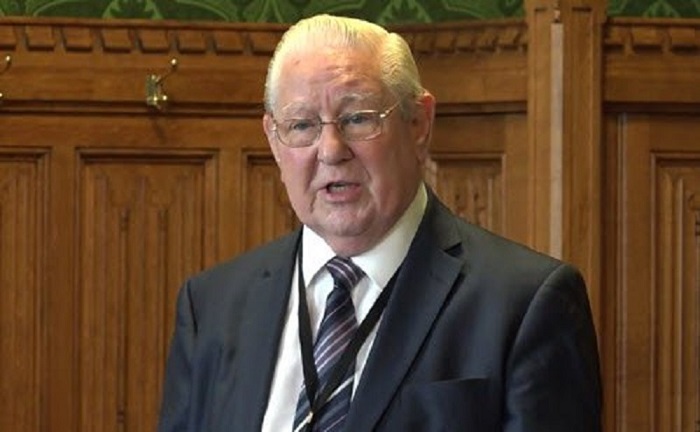
British MP Lord Clarke of Hampstead shares his frustration and expressed his concern with the report and the BBC’s decision to release a second, censored version against the MEK in an open letter to the BBC.
The recent broadcast by the BBC about the MEK and its subsequent censored release for Iranian state media has been met with outrage and a fair amount of exhaustion by the Iranian diaspora and their allies. The hit piece is simply a rehash of old MOIS propaganda that has been repeatedly disproven.
British MP Lord Clarke of Hampstead shares his frustration and expressed his concern with the report and the BBC’s decision to release a second, censored version in an open letter to the BBC. The following is an abridged version of his letter.
Open Letter by Lord Clarke of Hampstead to #BBC for Repeating #Iran Regime's Fabrications Against the #MEK https://t.co/44iNQgyDgj#FakeNews
— NCRI-FAC (@iran_policy) November 17, 2019
Lord Hampstead’s Letter
I would like to express my concerns about two BBC programmes on the Iranian opposition in Albania, the MEK, which was broadcast by BBC Radio 4 and BBC World Service on 7 November. A shortened version of this programme censuring facts and comments in favour of MEK was later broadcast by BBC Farsi.
Both programmes are neither fair nor objective on how they report on the subject and fail to observe minimum required journalistic objectivity and standards. For example, the reporter Linda Pressly claims that the MEK refused to interview with the BBC for the programme. However, the National Council of Resistance of Iran (NCRI)..rejected her claim in a statement on 7 November and said:
“[Linda Pressly] has deliberately chosen not to report that she and another BBC colleague were the guests of the PMOI at their home, Ashraf-3, for five-and-a-half hours. During the meeting, the MEK representatives told her that she could stay at Ashraf-3 as long as she wanted, privately talk to anyone and visit anywhere she so desired.”
The statement..goes on to express MEK’s concerns regarding participation of individuals in the programme who are known for their ties to the Intelligence Ministry of the Iranian regime (MOIS) and for a hostile agenda against the Iranian opposition based spreading MOIS propaganda under the disguise of “former MEK members.”
“The MEK representatives also told [Ms. Pressly] not to expect the MEK to be part of a program that was wittingly or unwittingly based on an MOIS script. They also told her that they should not be expected to be part of a program that also included individuals whose objective and mission is collecting intelligence and assisting the Iranian regime to conduct terrorist operations against the MEK…
[Y]our reporter failed to challenge these individuals on their proven connection to the MOIS and mention Tehran’s use of “former MEK members” to plan and carry out terrorist attacks against the MEK in Albania, as reported by the Albanian police on 23 October 2019, effectively rubber-stamping the MOIS demonisation campaign of the most organised opposition to the Iranian regime.It is worth noting that one of these individuals who was interviewed for the BBC programme was expelled from the MEK on security concerns, as explained by the NCRI…
The reference to the German Court concerns a similar reporting by the weekly German magazine Der Spiegel earlier this year based on the same baseless allegations. Following an injunction to the Press Chamber of the Hamburg Regional Court by the NCRI, the court found Der Spiegel to have acted illegally and that principles of permissible reporting have not been observed…
Together with many of my cross-party colleagues from both Houses of Parliament, I was personally involved in the international campaign for the safe relocation of MEK members out of Iraq in third countries…
#AyatollahBBC Trends on Twitter in Response to #BBC Hit piece
https://t.co/dS36TA1SLZ#MEK #Iran #FakeNews #FakeNewsMedia— MEK Iran (Mujahedin-e Khalq) (@MEK_Iran) November 17, 2019
In fact, when they were in Iraq, the MEK members were interviewed individually during months by seven U.S. security and intelligence agencies, which found none of them being involved in any illegal or terrorist activities. This rejects the notion of MEK members being controlled and denied access to the outside world. I also know this because my colleagues in the UK parliament and reporters from other international media visited the MEK in Albania, Ashraf 3, and spoke to its members, most recently this summer during the five-day Free Iran convention when the MEK welcomed the world to its new home.
It is hard to understand why the BBC deliberately excluded these important facts from its programme. The only explanation is that it has failed to do its due diligence and follow up on critical facts and evidence…
This is not to suggest that the BBC should not report on the important subject of the organised Iranian opposition but my argument is that you should engage with the MEK to produce a programme on a fair and objective basis, which also mentions the fact that over 120,000 of their supporters and members have been executed by the regime since 1979
